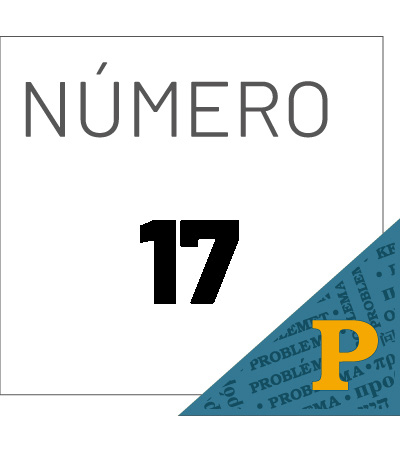Citizen Responsibility for Structural Corruption
The purpose of this essay is to explain what kind of responsibility citizens should assume for structural corruption. To delve into this topic, we analyze the components of a concept of structure as applied to the features of corruption, as well as the notions of guilt, responsibility and political responsibility. Thus, we argue that citizens who do not participate directly in acts of bribery are politically responsible for systemic corruption. Assuming political responsibility implies taking actions in the public sphere to combat the structure of corruption in conjunction with other citizens.
Article Details
Use of Creative Commons (CC) licences
All texts published by Problema. Anuario de Filosofía y Teoría del Derecho, without exception, are distributed under the CC-BY-NC-ND 4.0 International licence, which allows third parties to use what is published, as long as they mention the authorship of the work and the first publication in this Anuario.
Accessibility to articles and other publications in whole or in part under the concept of copying, distribution, public communication, interactive access (via the Internet or other means), while explicitly acknowledging the author(s) and the journal itself (acknowledgement of authorship).
Please note that if articles are remixed, modified or fragments are used in other creations, the modified material may not be distributed, nor may versions be reconstructed from the original published articles (derivative works).
The use of the contents of the published articles, in whole or in part, for profit-making purposes (non-commercial acknowledgement) is prohibited.
See https://creativecommons.org/licenses/by-nc-nd/4.0/

This work is licensed under a Creative Commons Attribution-NonCommercial 4.0 International License.
References
Ángel, A. (2016). La construcción retórica de la corrupción, Chasqui. Revista Latinoamericana de Comunicación, 132.
Banfield, E. C. (1958). The Moral Basis of a Backward Society. The Free Press.
Camacho Beltrán, E. & García González. F. (2019). When Corruption is Cultural: Exploring Moral, Institutional and Rule-Based Concepts of Corruption. Boletín Mexicano de Derecho Comparado, LI, 156.
Cane, P. (2002). Responsibility in Law and Morality. Hart Publishing.
Cortina, A. (2009). Ciudadanos del mundo. Hacia una teoría de la ciudadanía. Alianza.
Cuevas Molina, R. (2015). Guatemala: la trama de intereses en torno a la movilización ciudadana del 2015. Revista Brasileira de Estudios Latinoamericanos, 5(3).
Dworkin, R. (1993). Ética privada e igualitarismo político. Paidós.
Fragoso, L. (2019). La corrupción desde el mirador republicano: un concepto filosófico. En-Claves del Pensamiento, XIII, 25.
Giddens, A. (1979). Central Problems in Social Theory. Action, Structure and Contradiction in Social Analysis. Palgrave Macmillan.
Giddens, A. (1984). The Constitution of Society. Outline of the Theory of Structuration. Polity Press.
Gong, T. & Ma, S. K. (Eds.). (2009). Preventing Corruption in Asia. Institutional Design and Policy Capacity. Routledge.
Goodin, R. E. (1987). Apportioning Responsibilities, Law and Philosophy, 6(2).
Haslanger, S. (2012), But Mom, Crop-Tops are Cute! Social Knowledge, Social Structure, and Ideology Critique. Resisting Reality. Social Construction and Social Critique. Oxford University Press.
Haslanger, S. (2011), Ideology, Generics, and Common Ground. MIT Open Access Articles. http://hdl.handle.net/1721.1/71766
Haslanger, S. (2014). Social Meaning and Philosophical Method. Proceedings and Addresses of the American Philosophical Association, 88.
Haslanger, S. (2015). Social Structure, Narrative and Explanation. Canadian Journal of Philosophy, 45(1).
Johnston, M. (2014). Corruption, Contention and Reform. The Power of Deep Democratization. Cambridge University Press.
Klitgaard, R. (1988). Controlling Corruption. University of California Press.
Laporta, F. (1997). La corrupción política: Introducción general. In F. Laporta & S. Álvarez (Eds.), La corrupción política. Alianza.
Lovett, F. (2018). Republicanism. In E. Zalta (Ed.), The Stanford Encyclopedia of Philosophy. Stanford University. https://plato.stanford.edu/archives/sum2018/entries/republicanism/
Medina, J. (2013), The Epistemology of Resistance. Gender and Racial Oppression, Epistemic Injustice, and Resistant Imaginations.Oxford University Press.
Mungiu-Pippidi, A. (2006). Corruption: Diagnosis and Treatment. Journal of Democracy, 17(3).
NYE, J. (1967). Corruption and Political Development: A cost benefit analysis. American Political Science Review, 61(2).
Petit, P. (2011). Group Agency. The Possibility, Design, and Status of Corporate Agents. Oxford University Press.
Petit, P. (2007). Responsibility Incorporated. Ethics, 117(2).
Petit, P. (1995). The Cunning of Trust, Philosophy and Public Affairs, 24(3).
Rabotnikof, N. (2003). Corrupción política: definiciones técnicas y sentidos sedimentarios. In M. Carbonell & R. Vázquez (Coords.), Poder, derecho y corrupción. Siglo Veintiuno; ITAM; IFE.
Rose-Ackerman, S. (1978), Corruption. A Study in Political Economy. Academic Press.
Rose-Ackerman, S. (1999). Corruption and Government: Causes, Consequences, and Reform. Cambridge University Press.
Schiff, J. (2008). Confronting Political Responsibility: The Problem of Acknowledgment, Hypatia, 23(3).
Torres Rivas, E. (2015). Guatemala: la corrupción como crisis de gobierno, Nueva Sociedad, 257.
Young, Iris M. (2006). Responsibility and Global Justice: A Social Connection Model, Social Philosophy and Policy, 23(1).
Young, Iris M. (2011), Responsibility for Justice. Oxford University Press.


























